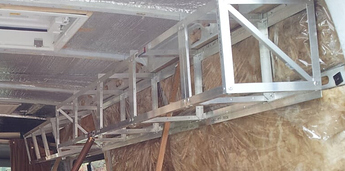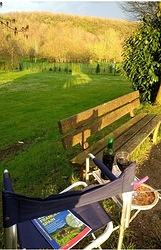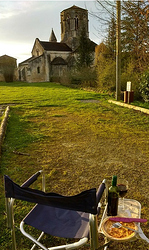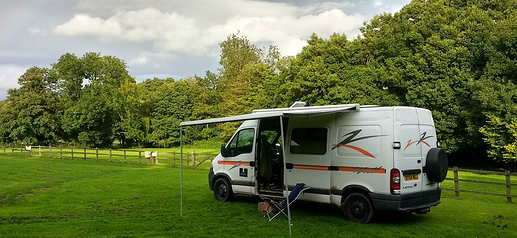We are doing some homework on the ownership of a camping car. We have owned touring caravans in the UK in the past so are not new to the consept and lifestyle. As the years have advanced we have tended to move towards hotel holidays but with the advent of Covid 19 we are thinking that our own space to travel around in would be much more preferable. We also said goodbye to our lovable giant Dylan earlier this year and now have just his little soulmate who while still very active is much more akin to a camping car life.
We are reasonably clued up to what we want but there areone or two questions that I am struggling to get answers for so if there are any camping car owners who would like to share their experiences we would love to hear your comments.
Most camping cars have a 3500kg gross weight so I presume they can be driven on a car license?
I currently own a transit van so am familiar with the 1 yearimmisions test between the 2 year CT, does the same apply for a camping car?
We would insist on full 2 years CT with any purchase ( we are not considering buying new!)
The cab and chassis are standard production as far as I can see but as a camping car is attached to it does it make the CT more ownerous?
Presumably any garage can do the servicing?
I fully understand that anyproblems with the camping car body, inside or out, would require specialist attention.
I think thats it for now and look forward to any constructive imput from members,
Thanks for reading.
Oh, and one last thing, if you own one and are considering selling then let us know!
You are correct that most camping cars have a Gross Vehicle Weight (PTAC) of 3500kg, for which you only need a B driving licence. However, a 3500kg limit does cause occasional problems with the amount left over for payload - many CCs of around 7 metres in length end up with a payload of only 3-400kg. So if you want to carry a lot of kit with you (e-bikes, awnings, etc etc) that can be restrictive.
Over 3500kg you are into the world of Poids Lourd vehicles, which you currently need C1 licence for. You’ll have that if you passed your car test before 1/1/97, but it expires at age 70 (72 on a French licence) and you must renew it, which is subject to a medical/eye test. These vehicles are also subject to lower speed limits - eg max 110kph on autoroute, whereas under 3500kg the limits are the same as for cars. You also have to watch for weight limits from time to time, and some roads are interdit.
Which is all a bit daft in many cases - our van is plated to 3800kg but is exactly the same size as many under 3500kg! But then poids lourd vans can be huge, based on truck or bus chassis.
Any decent seller will provide a new 2 year CT. For up to 3500kg vans this is the same test as for a car. It’s more complex for the 3500kg+ vans.
Mechanically, most vehicles are really not much more than a van chassis with a caravan body bolted on, so the servicing of the vehicle is no more complicated than your transit van. However, their size can be a problem, as many garages don’t have ramps big enough for 7m+ long vehicles. Also, A Class vans (the French call them Integrals) have bespoke body rather than a van cab, and this can complicate things and add costs - they have frighteningly expensive windscreens for example, and can be hard to get spares for, like mirrors, lights etc.
There are plenty of caravan/motorhome dealers in France who can easily look after the caravan elements - you’ll need the same sort of work done as you had with touring caravans - gas checks, damp etc.
The French market differs from the UK market in that equipment levels tend often to be much more sparse here. For instance it is rare to find an oven in a French van, whereas it’s almost always there in the UK. The weather has something to do with it - we try and avoid using the oven in summer as it heats the van up so much!
Finally - it’s a great way to see the country. France is so much more motorhome friendly than the UK. Whereas in UK you aren’t legally allowed to camp anywhere other than an officlal campsite, here there are places all over you can stay at, often free, with facilities available at little or no cost. We wouldn’t holiday any other way now.
Whereabouts are you? There is a brand new ‘passion campingcar’ place which has opened on the Bergerac bypass, I bet they would be delighted to tell all in the hope of gaining a customer.
Keeps researching try to cover all the bases, are you going to wild camp/ aires with not facilities, our use paid aires/campsites. Each throws up different aspects. Will it be youR only means of transport, parking on day to day use for shopping etc. What requirement from the van, just a base or extended stays, if off grid power requirements (tv etc) ease of making the bed, storage, carrying all the must have essentials that never get used. Height over 3 metre can throw up access / extra tolls.
We started with a pop top roof van forty years ago have owned one sort or another ever since, have spent the same amount of time servicing and repairing them. Now run a Burstner A Class (First A Class) mixed feelings about it. Bought a c lass new in 2012 (UK) and it was better equipped and more storage that this one seems a backward step. Anything you buy I would suggest you get whoever’s selling it to provide you with a weigh bridge certificate. Not so sure about over here but many UK makers are very optimistic about payload. Our last UK made quoted 440 kg payload, I took it to our local weigh bridge and could only carry 360 kg. This like a second battery unless lithium Will add around 20/25 kg. The payload quoted by the make will allow for the driver and 75 kg personal equipment 90 % fuel 90% water but this may vary. Anything else is part of your payload, your other half woofy wine will all add up. But wouldn’t be without ours just enjoy but do your homework.
North of Perigueux so will have a look 
Brilliant Richard
Thankyou so much for your clear concise information
Great info with thanks
Yes, we are busy doing our homework!
DAMP!! The biggest enemy of a camping car, if buying from a dealer see if its had the equivalent of a damp test in the UK. Under the sink, toilet shower area. And external lockers check the floor inside the door. Ours is 2019 and the rear garage door on the drivers side lets water in during heavy rain when parked up or driving spray from the road gets in. According to the dealer our last van (2012) was soaking, this in spite of regular use all year round an Alde heating system which are very good and kept in a well ventilated garage when not in use.
Weight … the bug-bear of the coach-built/manufactured camper. They lump in all those goodies, it looks fab - then you find, as has been said, there’s precious little capacity left for all your stuff.
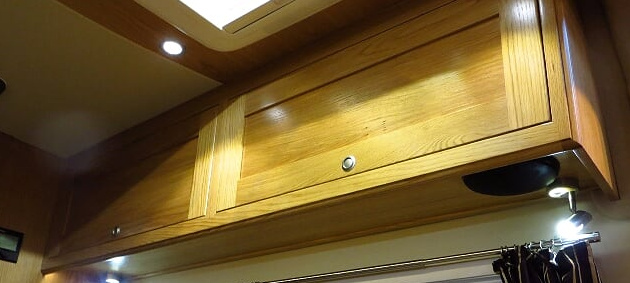
A van full of this - the builders have paid no regard for the lack of ‘headroom’ before the GVW maxes out.
I have a thing about weight - not least because you pay for every kg at the filling station. I built my own, based on a Renault Master lwb/hi-roof, till I got to the point where I didn’t need to add anything else. I have about 1000kgs payload capacity. I get 33-38mpg.
Space-frame lockers in rivetted ali angle - like a Spitfire. Strong and light.
Electrical capacity. France is blessed with thousands of municipal aires, many of them free. It’s places like this that you will not have been able to use, as a tugger. Some are just a bit of hard standing with a tank drain or a couple of bays round the back of a salle polyvalente but with the right rig, they are very convenient and in delightful spots.
To make best use of these you do need to work out and provide the electrical capacity that will keep the lights and fridge going. Hook-up is all very well but you want to be able to go for a few days off-grid.
Solar panels. Get the biggest that will fit where you can instal them. Ditto service batteries. If not already installed, you will then need an ‘intelligent’ controller to manage the charging system. CTEK controllers are first class.
Two x 100W panels feeding 2 x 110Ahr service batteries via a CTEK 250S. I installed the two roof hatches myself. They don’t leak.
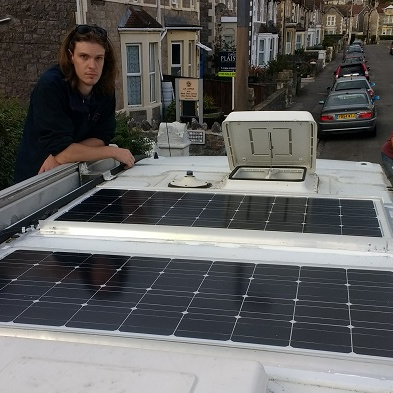
12V to 220V inverter will run a single plate induction hob. They do double hobs, as well. On hook-up, so much more convenient and safer than gas.
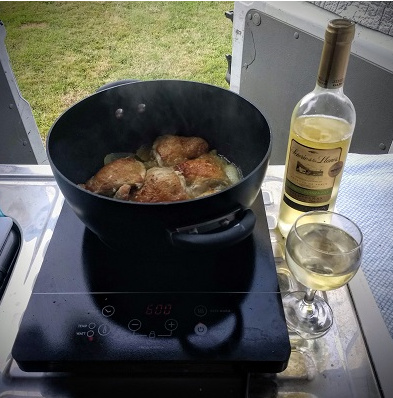
Off-grid chicken one-pot casserole in lovely Somerset.
Two websites I recommend. Endless sources of info, tech and touring - the Self Build Motor Caravan Club and [silly name] Motorhome Fun. The latter is principally for the coach-built crowd - endless threads about damp! And to tow or not to tow a small car.
All great info with many thanks. Since starting the topic we have overdosed on camping cars, viewing many and travelling many kilometres in the process. There is a lot of crap on the market with ex rentals, high kilometres and nicotine smelling interiors. We decided on a budget but soon realised that we needed to up it to satisfy our desires. We have bought from a dealer so plenty of guarantees and now are excited that in less than 2 weeks we will be proud owners of our nearly new, one careful owner camping car. The open road beckons and we looking forward to another of life’s adventures.
Thanks again for all the extremely useful advice.
If you live in south west you have this font vendome made in Brantome
Ohhh be sure to post a pic! How exciting for you!
I am amazed at the number and size of the camping car dealerships in FR. You go past one with 200 vans and in a minute or so, there’s another vast lot full of another 200. No wonder it’s so difficult getting ‘docamenti’ for self builds. The coach built trade can’t be doing with them and by some strange quirk, the people sailing desks agree.
What is stopping you building one?
French regulations, you can’t get them through.
I meet people that have built their one ones every time a go to a camp site
Really? Perhaps they have removable things as turning a normal van to a camper from all I’ve read is nigh on impossible here. Lots of people build things that can be taken out for when they do their CT!
“turning a normal van to a camper from all I’ve read is nigh on impossible here” It’s not the ‘turning into’ that’s nigh on impossible. It’s getting it registered as such.
A contributer to this topic did manage to get a camper registered but their van was to all intents and purposes a bespoke, one-off, professional coach-built, with invoices and spec sheets for everything.
Not the first time I have heard of bare panel vans going thru’ the CT and later having the camper bits re-installed - until next time.
The bed is an IKEA ‘day bed’ so, natuarlly, comes apart nicely. The high level wall cabs can be mounted on bolts captive to the vehicle instead of screwed in with self-drillers, to save fatiguing the screw holes. The fridge, cooker, basin - all demountable now. The only thing required to stay put are the solar panels on the roof and the two large service batteries and associated electronics. They live in a discreet box.
As a Vauxhall Movano is a re-badged Renault Master, with ‘Renault’ stamped into all the mechanicals, CoC shouldn’t be a problem.
Well, it should get an award. It’s fab, in the ‘cottage on wheels’ style of camper. AUS $ 70k is about £36,500/€40k.
I doubt it t would get authorisation in FR. If the builders were full-on with the paperwork it might, from that point of view. Whether the actual fit-out would pass is another question. “All corners must be rounded” is one FR stipulation.
Apart fom the awning [when retracted], with the original side door covering the wooden door, it’s very nearly a ‘stealth van.’
Women have an advantage when it comes to fitting into vans and boats, being generally smaller. Clare can evidently fit athwartships in bed. Mine, at 2m, has to be fore 'n aft
